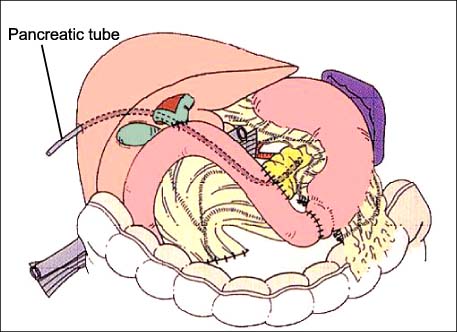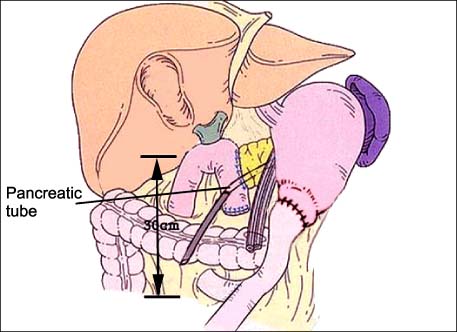J Korean Surg Soc.
2009 Aug;77(2):120-126. 10.4174/jkss.2009.77.2.120.
Comparing the Results of Method of Jejunal Anastmosis at Pylous-preserving Pancreaticoduodenectomy
- Affiliations
-
- 1Department of Surgery, Dong-A University College of Medicine, Busan, Korea. yhkim1@dau.ac.kr
- KMID: 2211291
- DOI: http://doi.org/10.4174/jkss.2009.77.2.120
Abstract
- PURPOSE
After performing pylous-preserving pancreaticoduodenectomy, there are several methods of performing pancreaticojejunostomy for preventing pancreatic leakage. The purpose of this study was to compare the results of two methods of jejunal anastomosis after pancreaticojejunostomy. METHODS: We retrospectively evaluated the clinical results of 49 patients who had received pancreaticojejunostomy for pylous-preserving pancreaticoduodenectomy. One method is the Billroth-I type, that is, choledochojejunostomy and pancreaticojejunostomy after anastomosis of one jejunum loop to the duodenum. The other method is the Roux-En-Y (R-Y) type. Choledochojejunostomy and pancreaticojejunostomy are done with an isolated jejunum loop. Then gastrojejunostomy is fashioned between the stomach and the distal jejunal segment. Finally, the end-to-side jejunojejunostomy is created. RESULTS: The Billroth-I type was used in 17 patients and the R-Y type was used in 32 patients. The median operation time was 397 min and 431 min, respectively. The median postoperative hospital day was 27.6 days and 22.1 days, respectively. The postoperative complications were 10 cases in 17 patients (58.8%) and 11 cases in 32 patients (34.4%), respectively. Leakage of the pancreaticojejunostomy was the most common complication in each group (23.5% and 15.6%, respectively). Most complications required no need surgical intervention. But two cases of Billroth-I type complications needed total pancreatectomy because of leakage of the pancreaticojejunostomy. CONCLUSION: Not only were there fewer complications for the R-Y type than for the Billroth-I type, but there was no need for operation to treat the complications of the R-Y type because of the isolated jejunal loop.
MeSH Terms
Figure
Reference
-
1. Whipple AO, Parsons WB, Mullins CR. Treatment of carcinoma of the ampulla of vater. Ann Surg. 1935. 102:763–779.2. Craighead CC, Lien RC. Pancreatoduodenal resection; comments on indications, operative diagnosis, staged procedures, morbid and lethal factors, and survivals. Ann Surg. 1958. 147:931–934.3. Yeo CJ, Cameron JL, Sohn TA, Lillemoe KD, Pitt HA, Talamini MA, et al. Six hundred fifty consecutive pancreaticoduodenectomies in the 1990s: pathology, complications, and outcomes. Ann Surg. 1997. 226:248–257.4. Balcom JH 4th, Rattner DW, Warshaw AL, Chang Y, Fernandez-del Castillo C. Ten-year experience with 733 pancreatic resections: changing indications, older patients, and decreasing length of hospitalization. Arch Surg. 2001. 136:391–398.5. Bassi C, Falconi M, Salvia R, Mascetta G, Molinari E, Pederzoli P. Management of complications after pancreaticoduodenectomy in a high volume centre: results on 150 consecutive patients. Dig Surg. 2001. 18:453–457.6. Marcus SG, Cohen H, Ranson JH. Optimal management of the pancreatic remnant after pancreaticoduodenectomy. Ann Surg. 1995. 221:635–645.7. van Berge Henegouwen MI, De Wit LT, Van Gulik TM, Obertop H, Gouma DJ. Incidence, risk factors, and treatment of pancreatic leakage after pancreaticoduodenectomy: drainage versus resection of the pancreatic remnant. J Am Coll Surg. 1997. 185:18–24.8. Yeh TS, Jan YY, Jeng LB, Hwang TL, Wang CS, Chen SC, et al. Pancreaticojejunal anastomotic leak after pancreaticoduodenectomy--multivariate analysis of perioperative risk factors. J Surg Res. 1997. 67:119–125.9. Tani M, Onishi H, Kinoshita H, Kawai M, Ueno M, Hama T, et al. The evaluation of duct-to-mucosal pancreaticojejunostomy in pancreaticoduodenectomy. World J Surg. 2005. 29:76–79.10. Bassi C, Dervenis C, Butturini G, Fingerhut A, Yeo C, Izbicki J, et al. Postoperative pancreatic fistula: an international study group (ISGPF) definition. Surgery. 2005. 138:8–13.11. Strasberg SM, Drebin JA, Soper NJ. Evolution and current status of the Whipple procedure: an update for gastroenterologists. Gastroenterology. 1997. 113:983–994.12. Yeo CJ. Management of complications following pancreaticoduodenectomy. Surg Clin North Am. 1995. 75:913–924.13. Yeo CJ, Cameron JL, Maher MM, Sauter PK, Zahurak ML, Talamini MA, et al. A prospective randomized trial of pancreaticogastrostomy versus pancreaticojejunostomy after pancreaticoduodenectomy. Ann Surg. 1995. 222:580–588.14. Cullen JJ, Sarr MG, Ilstrup DM. Pancreatic anastomotic leak after pancreaticoduodenectomy: incidence, significance, and management. Am J Surg. 1994. 168:295–298.15. Grace PA, Pitt HA, Tompkins RK, DenBesten L, Longmire WP Jr. Decreased morbidity and mortality after pancreatoduodenectomy. Am J Surg. 1986. 151:141–149.16. Howard JM. Pancreatojejunostomy: leakage is a preventable complication of the Whipple resection. J Am Coll Surg. 1997. 184:454–457.17. Poon RT, Lo SH, Fong D, Fan ST, Wong J. Prevention of pancreatic anastomotic leakage after pancreaticoduodenectomy. Am J Surg. 2002. 183:42–52.18. Hamanaka Y, Nishihara K, Hamasaki T, Kawabata A, Yamamoto S, Tsurumi M, et al. Pancreatic juice output after pancreatoduodenectomy in relation to pancreatic consistency, duct size, and leakage. Surgery. 1996. 119:281–287.19. Montorsi M, Zago M, Mosca F, Capussotti L, Zotti E, Ribotta G, et al. Efficacy of octreotide in the prevention of pancreatic fistula after elective pancreatic resections: a prospective, controlled, randomized clinical trial. Surgery. 1995. 117:26–31.20. Buchler M, Friess H, Klempa I, Hermanek P, Sulkowski U, Becker H, et al. Role of octreotide in the prevention of postoperative complications following pancreatic resection. Am J Surg. 1992. 163:125–130.21. Kang HC, Ryu SY, Kim HY, Han S, Lee MS, Kim HJ, et al. Long percutaneous stent insertion in pancreatic duct and monitoring of pancreaticojejunostomy site leakage in periampullary cancer patients. J Korean Surg Soc. 1999. 56:420–426.22. Bassi C, Falconi M, Molinari E, Mantovani W, Butturini G, Gumbs AA, et al. Duct-to-mucosa versus end-to-side pancreaticojejunostomy reconstruction after pancreaticoduodenectomy: results of a prospective randomized trial. Surgery. 2003. 134:766–771.23. Telford GL, Mason GR. Pancreaticogastrostomy: clinical experience with a direct pancreatic-duct-to-gastric-mucosa anastomosis. Am J Surg. 1984. 147:832–837.24. Hicks RE, Brooks JR. Total pancreatectomy for ductal carcinoma. Surg Gynecol Obstet. 1971. 133:16–20.25. Icard P, Dubois F. Pancreaticogastrostomy following pancreatoduodenectomy. Ann Surg. 1988. 207:253–256.26. Lygidakis NJ, Jain S, Sacchi M, Vrachnos P. Reappraisal of a method of reconstruction after pancreatoduodenectomy. Hepatogastroenterology. 2005. 52:1077–1082.
- Full Text Links
- Actions
-
Cited
- CITED
-
- Close
- Share
- Similar articles
-
- A modified single jejunal loop reconstruction by performing proximal gastrojejunostomy after Whipple's pancreticoduodenectomy in a low-volume hospital
- Migrated Pancreaticojejunal Stent Forming a Stent–Stone Complex in the Jejunum with Resultant Small Bowel Obstruction: A Case Report
- Pylorus-preserving Proximal Gastrectomy vs. Total Gastrectomy with Jejunal Interposition for Proximal Gastric Adenocarcinomas
- A procedure for delayed gastric emptying on pyloric preserving pancreaticoduodenectomy
- Pylorus preserving pancreaticoduodenectomy; short term result



